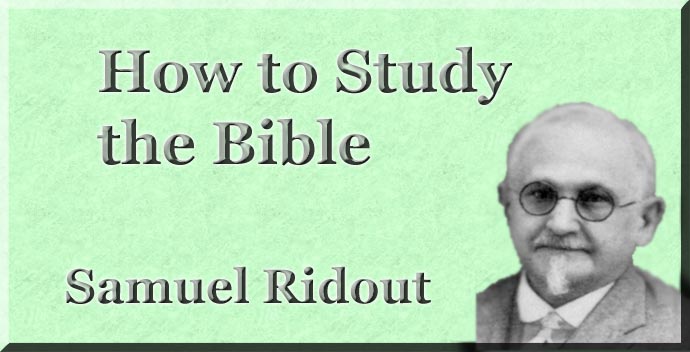
How to Study the Bible
By Samuel Ridout
Chapter 6
Part 1. Methods of StudyBiographical StudyThis feature of Bible study need not detain us long, although it is exceedingly interesting. Perhaps the earliest lessons of divine truth are learned at the mother's knee in the stories of our first parents, of Abel, Noah, Abraham, Joseph, Moses, David, and above all, of our blessed Lord Jesus. As we have frequently said, God's precious word is not a dull encyclopedia of religious facts and truths, but a delightful unfolding of the life of God in men of like passions with ourselves on the one hand, and yet the subjects of divine grace on the other who have obtained a precious faith which ever produces fruits which are according to God. The simplest method here is probably the best. We can begin with Adam and learn all that the Scripture has to teach about him, and follow it up with every other man of faith throughout the Scriptures. The biography of such a man as Moses will give us the history of his times and the stirring events of which he forms so large a part. Genesis itself, as we have seen, is a book of seven biographies. We do not pretend to make a list here of all the Old and New Testament worthies. What a list it is, however! Let each one write it out as fully as may be, and perhaps dedicate one day to thinking over all that he can remember about a character. This might come in as a kind of a change from other lines of study. A sad duty, also, is the preparation of a list of those who furnish warnings instead of example, headed by Cain and followed by such men as Korah, Dathan, Abiram, king Saul, all the kings of Israel after the division, and many of those of Judah, Ahithophel, Absalom, Judas Iscariot. What a dark list it is! As to methods of study here, we would only suggest that we should endeavor to get as clear a conception as we can of each character historically, in his individual relation to God, to the times in which he lived and to the persons with whom he was thrown. It is very striking that we find how faithfully God has delineated the character and conduct of His beloved people. He gives us a picture of "Solomon in all his glory," and yet does not hide from us the exceeding folly of the wisest of men when he allowed strange women to turn away his heart from God. David, the man after His own heart, is not spared in the faithful narrative which shows his weakness in connection with Joab and his awful sin of which he so deeply repented and for which he was so faithfully chastened. Even Abraham, "the friend of God," was not perfect. Indeed, there is the biography of but one perfect Man in the entire inspired volume, and how good it is that we have, not merely one, but four inspired biographies of Him, presenting Him to us in every phase of character in which we should know Him — in His official dignity as King, as in Matthew; in His prophetic and yet lowly service narrated in Mark; as the Man who knew every human need and felt every human sorrow as in Luke, and as the One who was in the bosom of the Father and remained there even as He walked the earth and witnessed for Him, recorded in John. But the subject of our Lord's life must stand largely by itself and is treated of elsewhere.1 After we have gained a fairly complete and accurate outline of the life of our character, we can proceed with care to note the typical significance of the biography as given to us. Thus, evidently, Joseph is a type of Christ, both in His rejection and glory. His brethren figure Israel, their sin, repentance and restoration,while blessing goes out not merely to the seed of Israel, but world-wide through him who is put upon the throne of Egypt. So many, perhaps all, Old Testament historical characters are typical as well. Let us only be careful in our study in this delightful field, that we keep the due proportion of truth and that all harmonizes with the setting in which it is placed. Nothing is here of a haphazard character, and the student should guard carefully against mere similitudes or suggestions which are really not of a typical character. Unless our readers have the time and inclination for much writing, we have nothing special to suggest as to the use of the note-book in these biographical studies, beyond the free jotting down of whatever occurs to us at the time when it passes through the mind — which otherwise may be lost sight of. Where one is engaged, however, in Sunday-school work, a very delightful exercise would be to assign certain biographical characters to the children as subjects for compositions which they could prepare and hand in, or which might be read in the class, or a selection of them to the school at large. How much delightful service there is indeed in the things of God! Truly we are not straitened in Him!
|
|
 |
 |
|
1 The Handbook on the Four Gospels. |
|
-
Site Navigation
 Home
Home What's New
What's New Bible
Bible Photos
Photos Hiking
Hiking E-Books
E-Books Genealogy
Genealogy Profile
Free Plug-ins You May Need
Profile
Free Plug-ins You May Need
 Get
Java
Get
Java.png) Get Flash
Get Flash Get
7-Zip
Get
7-Zip Get Acrobat Reader
Get Acrobat Reader Get
TheWORD
Get
TheWORD